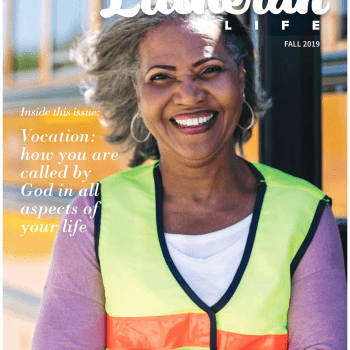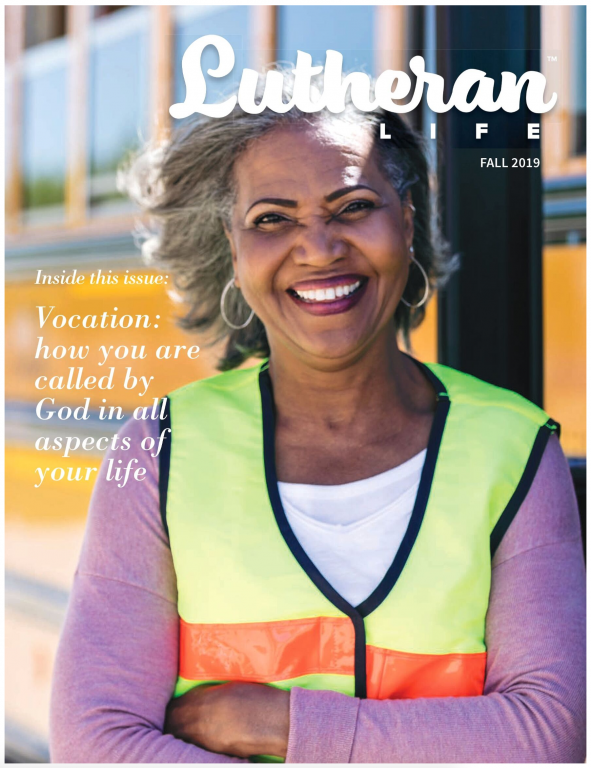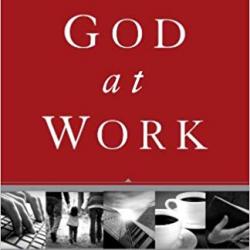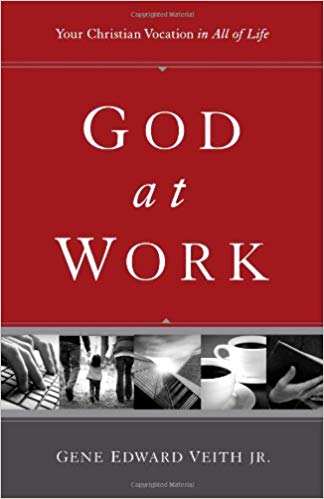Happy Labor Day, a holiday in which we should celebrate and reflect on our vocations. Remember that the theology of vocation has to do with all of the tasks, relationships, and offices that God calls us to. Not just our “work,” but also our families (our marriages, being a parent, being a child to our parents, being part of our extended family), our citizenship (in our communities, country, and culture), and our churches (being a member of our congregation, being a part of the Body of Christ throughout the world and throughout time, being a baptized child of God).
I commend to you for your Labor Day meditation a sermon preached by that great theologian of vocation, Martin Luther. It’s about the Sermon on the Mount, with a wonderful reflection on the birds of the air and the flowers of the field and how they too serve God. God takes care of them, and He takes care of us, including by means of the vocations that He calls us to.
The birds do have their labors, but what they do not have is anxiety. Nor should we be anxious, as if God will not take care of us. And yet, as Luther shows, there is also an anxiety that is good: “the anxious care of love.”
From Martin Luther, Fifteenth Sunday after Trinity, text: Matthew 6:24-34. Church Postils [The Sermons of Martin Luther, trans. John Nicholas Lenker, Vol. 5]:
God gives us the wool, that he grows on the sheep; but it is not at once cloth, we must labor and make it into cloth; when it is cloth, it does not at once become a coat, the tailor must first work with the cloth before it is a coat; and so God does with all things, he cares for us, but we must toil and work. We have plenty examples of this before our eyes, and God relates especially two here that should really make us blush with shame, namely, those of the birds and the lilies in the field. Pointing to the birds he says: “Behold the birds of the heaven, that they sow not, neither do they reap, nor gather into barns; and your heavenly Father feedeth them.”
As if the Lord would say: You have never yet seen a bird with a sickle, with which it harvested and gathered into barns; yea, the birds do not labor like we; and still they are nourished. By this the Lord does not however teach that we are to be idle; but he tries by this example to take all anxiety from us. For a bird cannot do the work of a farmer as we do; yet, it is not free from labor, but it does the work for which it was created, namely, it bears its young, feeds them and sings to our Lord God a little song for the privilege of doing this. Had God imposed more labor upon it, then it would have done more. Early in the morning it rises, sits upon a twig and sings a song it has learned, while it knows not where to obtain its food, and yet it is not worried as to where to get its breakfast. Later, when it is hungry, it flies away and seeks a grain of corn, where God stored one away for it, of which it never thought while singing, when it had cause enough to be anxious about its food. Ay, shame on you now, that the little birds are more pious and believing than you; they are happy and sing with joy and know not whether they have anything to eat. . . .
Behold the flowers of the field how they are adorned and clothed, neither do they anything to that end; they neither spin nor work, yet they are beautifully clothed.
By this illustration the Lord again does not wish to have us cease to sew and work, but we should labor, spin and sew, and not be overanxious and worry. . . .Thank you, flowers, you, who are to be devoured by the cows! God has exalted you very highly, that you become our masters and teachers. . . .
The flower stands there that we should see it, it strikes us and says: If thou hadst the adornment of the whole world even then thou wouldst not be equal to me, who stand here, and am not the least worried whence this adornment comes to me. I do not however concern myself about that, here I stand alone and do nothing and although thou art beautifully adorned, thou art still sickly and servest impotent mammon; I however am fresh and beautiful and serve the true and righteous God.
In the sermon, Luther also discusses the difference between faith (which is internal) and love (which is external). He says that while we should not have anxiety in our faith towards God, as the examples of the birds and the flowers teach us, it is quite appropriate to have anxiety in our love for our neighbors, which is the purpose of vocation. That is, in our concern for others. It is fitting for parents to worry about their children, or citizens to be anxious about their country, or workers to be fretful about their customers, or parishioners to be in anguish about their fellow Christians in need.
Our life and a Christian character consist of two parts, of faith and of love. The first points us to God, the other to our neighbor. The first, namely faith, is not visible, God alone sees that; the other is visible, and is love, that we are to manifest to our neighbor. Now the anxiety that springs from love is commanded, but that which accompanies faith is forbidden. If I believe that I have a God, then I cannot be anxious about my welfare; for if I know that God cares for me as a father for his child, why should I fear? Why need I to be anxious, I simply say: Art thou my Father, then I know that no evil will befall me, as Psalm 16:8 says: “I have set Jehovah always before me: because he is at my right hand, I shall not be moved.” Thus he has all things in his hand; therefore I shall want nothing, he will care for me. If I rush ahead and try to care for myself, that is always contrary to faith; therefore God forbids this kind of anxiety. But it is his pleasure to maintain the anxious care of love, that we may help others, and share our possessions and gifts with them. Am I a ruler, I am to care for my subjects; am I a housefather, I must take care of the members of my family, and so forth, according as each one has received his gifts from God. God cares for all, and his is the care that pertains to faith. We are also to be interested in one another and this is the care of love, namely, when something is given to me, that I be diligent so that others may also receive it.
HT: Jackie
Image by Cock-Robin from Pixabay



















